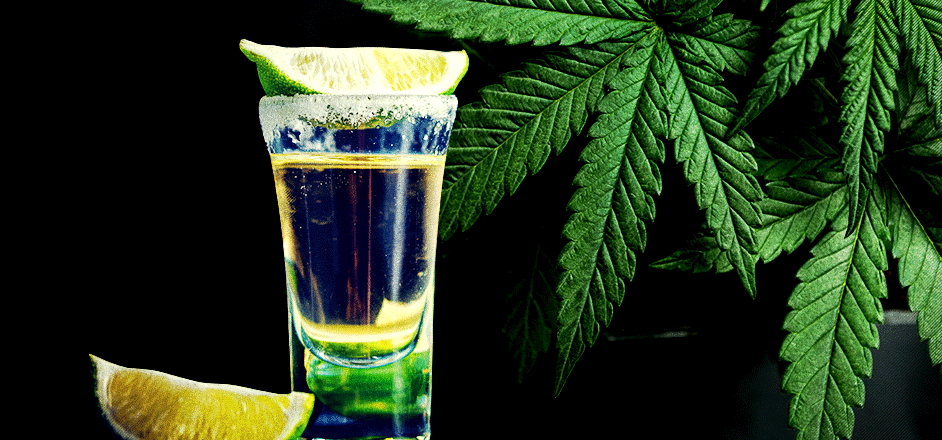In the future, creating cannabinoids like THC and CBD is going to be a lot easier and a lot cheaper than it is today — and people won’t even need marijuana plants to do it.
Instead, these cannabis molecules will be churned out en masse at laboratories and they’ll be made using tequila bacterium. No plants necessary. No bud needed. Just some microscopic organisms and a little chemical knowhow.
Yes, you read that correctly: scientists will be using tequila to make marijuana products. As if there weren’t enough reasons to love tequila already, this is truly the cherry on top. And it very well could revolutionize the world’s access to cannabinoids and the global cannabis industry at large.
The extremely unique technique was recently patented by Farmako, a German pharmaceutical company and it outlines a groundbreaking way for synthesizing cannabinoids out of bacterium produced in the distillation process of tequila. By genetically modifying this bacterium, the scientists discovered that they could get it to spit out THC instead of tequila.
Like the alchemists of old, who sought to turn lead into gold, these crafty-pharmacists have conceived of a process that will undoubtedly make them richer than kings. If growing marijuana is like planting money trees, synthesizing cannabinoids in this manner is like having your own cash printing machine. It’s a green motherlode.
“The production of cannabinoids… will be synthetic in the future,” Niklas Kouparanis, founder and CEO of Farmko said. “With the patent application, we have now managed to remove a big question mark from the world as to exactly what this production looks like.”
This discovery will make industrial scale production of THC, CBD and other useful cannabinoids extremely cheap and “a thousand times easier” compared to traditional methods. Why waste time, money and energy growing plants, harvesting bud, drying it out and packaging it, when one could just feed a particular bacteria strain sugar and let it do all the work?
Once this method becomes widespread the world will have more cannabinoids than we’ll know what to do with. Which, undoubtedly, will drive the price of pot products down significantly.
That’s good news for consumers, but it might sound like a death peal for many cannabis growers. When scientists can chemically whip up the same product that takes them months to grow and process and a lot of manpower to produce, with a cheaper more efficient method, trouble looms on the horizon. If these tequila generated cannabinoids become popularized and widespread, the only thing that traditional cannabis growers will be needed for, is high quality flower for the old school stoners out there. They’ll still have a niche to fill — it’s just going to be far more competitive.
There are also some pretty significant environmental benefits for producing cannabinoids without having to grow marijuana plants. It’s no secret, pot grow-ops are really hard on the environment; even the ones that are operating legally and according to state sustainability guidelines. Between the energy they use, the water they consume, the chemical additives that are used and the volatile organic compounds (VOCs) that the plants generate as they grow, the business of growing pot (especially on an industrial scale) is harsh on the environment.
However, if all, or even most of the THC/CBD used for non-flower products like edibles, salves and capsules, is produced in a petri dish by a bacterium, all of those environmental risk factors go flying out the window. As far as the environment is concerned, tequila cannabinoids are definitely a more sustainable option.
Farmako’s discovery comes just weeks after a team of researcher from UC Berkeley similarly discovered a way to make THC by bioengineering brewer’s yeast. By injecting cannabis strains into common brewer’s yeast (which is used to make beer) these researchers found that they could create THC and CBD molecules without the plants.
However, according to Patrick Schmitt, Farmko’s chief science officer and co-founder, using tequila bacterium to do this is much, much easier than using yeast.
“Although brewer's yeast can be used to produce cannabinoids, the cells have to be broken up after this synthesis, which stops production,” Schmitt stated in a press release. “This is very difficult if the production is to be transferred to an industrial scale. Zymomonas cannabinoides® [tequila cannabis bacteria], on the other hand, releases the produced cannabinoids directly into the surrounding medium. This allows continuous production without interruption.”
That would allow them to produce an endless and unstoppable quantity of cannabinoids for both medicinal and recreational uses. Should this method for producing pot pick up, things are going to start changing in the cannabis industry radically. And it’s all thanks to tequila.
Which is definitley something to drink to.





Leave a Reply
You must be logged in to post a comment.